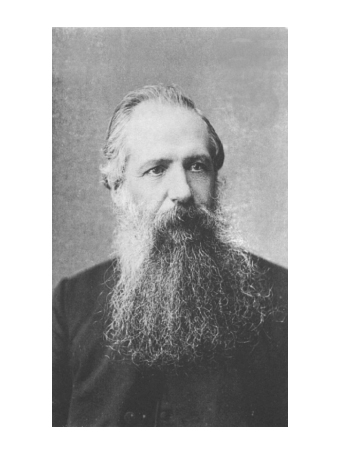31 December 1865
Henry Clarke on the negro-hating, slave-loving oligarchy in Jamaica

Rev Henry Clarke
HENRY CLARKE, who died in Jamaica in 1907 aged 79, emigrated to the island in 1847 to take up a teaching post at Savanna La Mar. He left behind an extraordinary amount of personal writing including a six-volume diary covering the whole of his life. When the Jamaican House of Assembly was finally dissolved to make way for Crown government following the Morant Bay Rebellion in 1865, Henry wrote that it was an improvement for it delivered the local poor “out of the hands of that slavery-loving oligarchy which for 200 years has so mightily oppressed them”.
In 1851 he returned temporarily to England to marry Jane Lister, with whom he had eleven children. Deeply religious, he was ordained in Jamaica in 1852 and began his ministry in Lucea in 1853, where he continued to teach for the next two years.
In 1857 he started a lifelong interest as an inventor, periodically returning to England in a series of unsuccessful attempts to patent his designs. These included rotary and turbine steam engines, an aerial screw (flying machine) and aerial screw steamer (a boat powered by the same principles), and a velocipede.
As an Anglican priest he took a strong stance on the rights of Jamaica’s Coolie and Creole immigrants and an interest in the position of ex-slaves and their descendants. In 1873 he founded the Westmoreland Building Society, one of the cornerstones of the later Jamaica Public Building Society. At the same time, he came into personal conflict with the episcopal authorities, nearly losing his living in the process.
In 1894 he resigned his living and was elected to the island’s Legislative Council, although he continued preaching in various churches including Baptist and Wesleyan congregations. As a member of the Legislative Council, he was involved in discussions involving introducing paper currency and put forward a bill for registering illegitimate fathers, although this was never enacted.
This is taken from his diary of 31 December 1865.
I have lived in this island during the last eighteen years, and have never had but one opinion of its government, which has been as corrupt, immoral, and oppressive, as any which has ever existed on the face of the earth. The whole influence of the Negro-hating, slavery-loving oligarchy which has ruled us has been openly and avowedly directed to the impoverishing of the Negroes, in order that they might be able to compel them to work at their own rate of wages.
This was the object of high import duties on the necessaries of life, and of Coolie immigration; which, of my own knowledge, I affirm to be a most atrocious form of the slave-trade and of slavery, expressly designed to lower the wages of the free Negro. I attribute the existing poverty and demoralisation among the people of my district, in a great measure, to the practice which the estates adopted of moving the Negro villages periodically, in order to prevent the labourers from profiting by the bread-fruits, cocoa-nuts, and other trees of slow growth, which they plant around their dwellings.
Every village of the estates in this district, of five thousand inhabitants, has been moved within the last ten years; and as the people have to pull down and rebuild their cottages at their own expense, they have got into the way of erecting miserable little huts, in which the poor things are compelled to live, like pigs in a sty. I now humbly thank God that I have not appealed to Him in vain, and that He has scattered, in a moment, that detestable oligarchy which for full two hundred years has bought, sold, flogged, robbed, maimed, tortured, and debauched the poor black people of Jamaica.
The licentiousness of white men in Jamaica has been, and in many parts is still, as boundless as it is unblushing. The laws, as well as the records, of Jamaica are such as should make every honest Englishman blush with shame for the savage barbarities his countrymen are capable of, when left to the exercise of their natural propensities, unrestrained by any fear of public opinion or of the law. The Negroes are as loyal and peaceable, and would be as industrious and virtuous, as any people in the world, if they were wisely and honestly governed.
Henry Clarke (1828 – 4 August 1907)
See The Life and Times of Henry Clarke of Jamaica 1828-1907 by James Walvin, Frank Cass, 2005.
Available as a download from https://epdf.pub/queue/the-life-and-times-of-henry-clarke-of-jamaica-1828-1907.html
